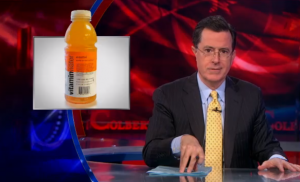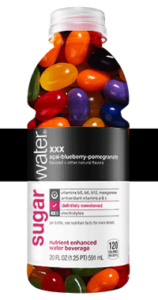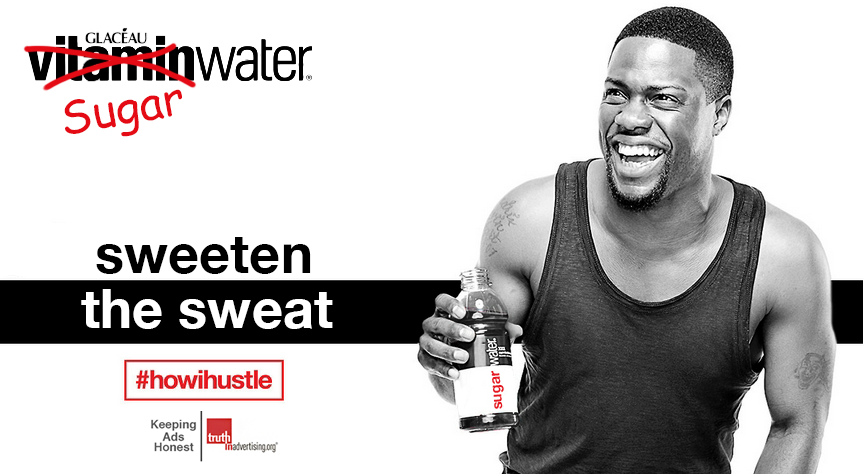
Best Reader Tips of 2021
This year reader tips led to dozens of ad alerts, as well as a complaint to regulators.
Settlement scorecard: Lawyers, a cool million; consumers, nothing.
|
When it comes to the battle over the misleading marketing of vitaminwater as a healthy drink, consumers have lost an important fight. A federal judge Monday, despite an objection by TINA.org and others, gave final approval to a class-action settlement that awards attorneys $1.2 million for suing the company and gives nothing to consumers who bought the drink under the mistaken impression from the marketing that it was a healthy alternative to soda.
“TINA.org’s analysis of the settlement revealed that it’s a raw deal for consumers. We are disappointed by the decision but the fight isn’t over, as there are other lawsuits still pending,” said Bonnie Patten, executive director of TINA.org.
Here’s the background

The Center for Science in the Public Interest (CSPI), which had also filed an objection to this settlement, first sued Coca-Cola (which owns the brand) in 2009 over the misleading marketing of the product as healthy. Specifically, the advocacy group took issue with vitaminwater’s claims at the time that it could reduce the risk of eye disease, promote healthy joints, as well as supporting optimal immune function when, in reality, the huge amount of sugar in the product promotes obesity, diabetes, and other health problems. CSPI also objected to the product names such as “defense” and “endurance.” Coca-Cola fought back arguing that no reasonable consumer could be misled into thinking vitaminwater was a healthy beverage but last year a federal judge rejected this defense.
Numerous private class-action attorneys jumped on the bandwagon after CSPI filed suit and filed actions against Coca-Cola in various states, including Ohio, Florida, Illinois, Missouri, and the Virgin Islands. (These five cases were consolidated in Ohio federal court.) The suits made allegations similar to those in CSPI’s lawsuit and sought several remedies, including compelling the company to change the name of vitaminwater, and preventing the company from using any advertising terms that suggest the drink is healthy.
What’s in vitaminwater
 Glacéau –a division of Coca-Cola — heavily markets vitaminwater as a healthy alternative to soft drinks and consumers pay a premium price for it. The thing is, each 20-ounce bottle of vitaminwater actually contains more than 30 grams of sugar. That’s more sugar than six Oreo cookies and also more than a standard Hershey’s chocolate bar. In fact, one bottle of vitaminwater contains more sugar than adults of normal body mass should be consuming in an entire day, according to the World Health Organization’s new proposed sugar guidelines.
Glacéau –a division of Coca-Cola — heavily markets vitaminwater as a healthy alternative to soft drinks and consumers pay a premium price for it. The thing is, each 20-ounce bottle of vitaminwater actually contains more than 30 grams of sugar. That’s more sugar than six Oreo cookies and also more than a standard Hershey’s chocolate bar. In fact, one bottle of vitaminwater contains more sugar than adults of normal body mass should be consuming in an entire day, according to the World Health Organization’s new proposed sugar guidelines.
In July, Coca-Cola and the attorneys for the Virgin Islands and the other four states in the consolidated suits reached a $1.2 million agreement to settle the claims that the beverage is deceptively marketed. But hold up, the settlement awards no money to the consumers in the class. Instead, the attorneys who brought the suits pocket the money (and decide what, if any, money to give to just the six named plaintiffs). And the settlement also allows Coca-Cola to continue marketing the drink as vitaminwater, a “nutrient enhanced water beverage,” which sounds, oh so healthy.
Marketing hardly changes
On October 21 TINA.org requested that the court allow it to object to the settlement and explained in detail the reasons the agreement is unfair. Because Coca-Cola agreed to some limited concessions, those involved in the case could argue that the settlement does benefit consumers. But TINA.org looked closely at the terms of the concessions and found that they are of limited value to consumers. For example, the company agreed to list the amount of calories per vitaminwater bottle on its principal display panel, but it already displays the calories on its front label. So not much new there for consumers. And it agreed not to use certain phrases that it had already stopped using. Also, the settlement doesn’t stop Coca-Cola from continuing to call the drink vitaminwater, using the slogan “nutrient enhanced water beverage,” or using health-conscious names such as “defense” and “revive” for its drinks.
“Given these facts,” TINA.org said in its brief, “it is readily apparent that the proposed settlement agreement gives the false impression that defendants are making changes to their marketing in exchange for the class dropping its lawsuit when, in reality, defendants are providing only illusory consideration and a lot of money to plaintiffs’ counsel in order to end this litigation.”
Consumers left out
In the world of class actions, there have been cases where courts rejected the proposed settlement precisely because all the money went to plaintiffs’ attorneys and not to consumers. Indeed, in 2013, a proposed class-action settlement regarding a case against Procter & Gamble (also in Ohio federal court) that awarded $2.37 million to attorneys representing consumers was rejected on appeal because consumers were not awarded any money. Said the appeals court, “… settlement classes create especially lucrative opportunities for putative class attorneys to generate fees for themselves … The danger being that the lawyers might urge a class settlement at a lower figure or on a less-than-optimal basis in exchange for red-carpet treatment on fees.”
Consumers speak up
Several consumers have filed objections to the settlement. Cathy Herrick, an Ohio resident, said she was grappling with an illness and bought the product to revitalize herself. Herrick wrote to the court:
I was trying to achieve optimal health prior to my surgery and obviously was misled and was consuming a product that actually had no more benefit than drinking a soft drink, which I do not consume. In all actuality, I may have caused more harm than good by drinking these products …
Judge’s ruling
But Judge Michael Barrett said in his decision that the company had changed some marketing practices “which in and of itself achieved some of the stated goals.” An appeal of the decision was dismissed in June.
Read more here about TINA.org’s efforts to protect consumers with objections to other settlements.
Update 10/2/15: CSPI reached a preliminary settlement with Coca-Cola in September that would require the company to add the words “with sweeteners” in two places on the label, and remove ten specific statements. The settlement also awards $2.73 million to the attorneys for CSPI but no compensation for consumers who purchased the products. A final approval hearing on the settlement will be held on Feb. 3, 2016.
This year reader tips led to dozens of ad alerts, as well as a complaint to regulators.
It’s the perfect formula for a class-action lawsuit trend.
These marketing claims are feeling the heat.


